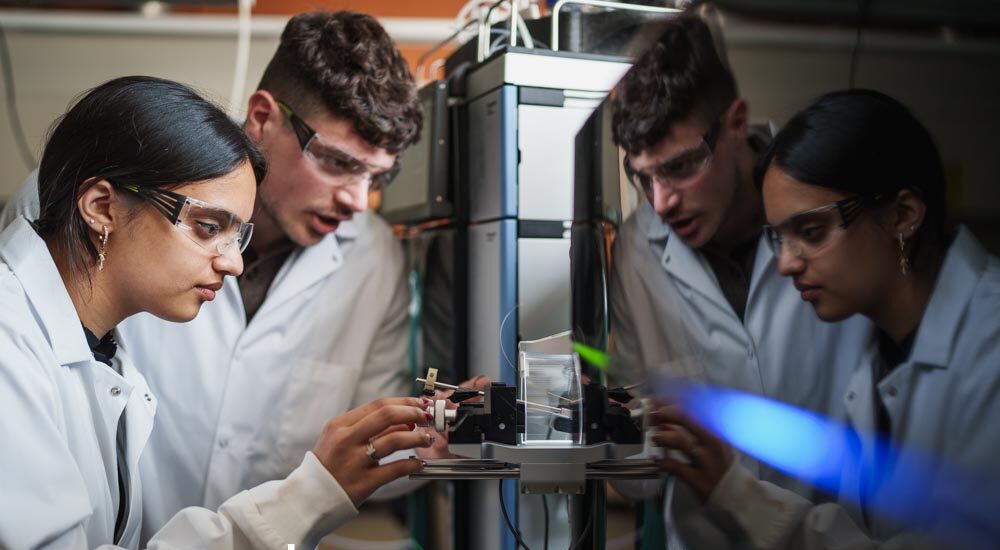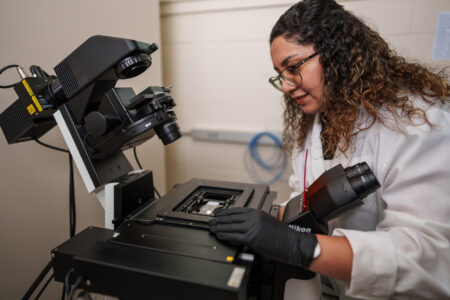Born and raised in New Hampshire, Nicholas Zylinski originally planned to pursue an MSc in Medical Microbiology. But in 2022, as an undergraduate at Salem State University, his path took an unexpected turn.
While working as a teaching assistant for a cell biology lab, Zylinski often discussed bacteria, archaea, algae, fungi, protozoa, viruses, and other simple life forms with his professor. One day, she suggested that he explore a broader industry background, noting that gaining experience solely in microbiology could be challenging. Given his interest in technology and molecular therapies like phage therapy, she encouraged him to consider biotechnology, particularly a programme with a concentration in molecular sciences.
Her advice stuck with him. After reflecting on his career goals and researching his options, Zylinski shifted his perspective. By the end of 2022, he was applying to graduate programmes at the University of New Hampshire (UNH). During his search, he discovered UNH’s MS in Molecular and Cellular Biotechnology (MCBT) programme — a relatively new offering that aligned perfectly with his interests.
“Seeing the degree title and reaching out to the programme coordinator, I quickly developed a strong curiosity and love for the programme,’ he says. “This love soon cemented my decision to participate in the MCBT programme, and the rest is history.”

UNH’s College of Life Sciences and Agriculture (COLSA) advances research in disease treatment, ecosystem dynamics, and sustainable global food systems, driving solutions for a better future. Source: University of New Hampshire
Located in the heart of New England, UNH is New Hampshire’s flagship public university and a research powerhouse, with its labs and scientists recognised among the best in the nation. The Carnegie Classification of Institutions of Higher Education designates UNH as a top research institution. For over 150 years, the university has been known for its teaching, research, and hands-on learning experiences that connect students with faculty, as well as private and public partners.
The College of Life Sciences and Agriculture (COLSA) is one of five colleges on UNH’s picturesque Durham campus. With a focus on research and innovation, COLSA’s faculty and students are committed to improving the world. Its location near Boston and the Massachusetts technology and life sciences corridors provides students with unique opportunities to collaborate with leading biotech and pharmaceutical companies.
“Take your pick; there is something that fits everyone’s background,” Zylinski says.

At UNH’s COLSA, students learn from top faculty, contribute to groundbreaking research, and build connections for lifelong success. Source: University of New Hampshire.
Programmes offered at COLSA include the MS in Bioinformatics and MCBT. Both emphasise extensive lab experience, strong industry connections, and training on cutting-edge instruments essential for careers in biotechnology, pharmaceuticals, and regenerative manufacturing.
MCBT is a non-thesis programme that prepares students with the knowledge and laboratory skills to accelerate their careers in the biotechnology and pharmaceutical industries. It’s experiential – there are internships with local and regional companies, graduate-level lab courses, and independent research stints in MCBT faculty laboratories.
Most students complete their MCBT master’s degree in two semesters plus a summer research or internship experience, allowing for a swift transition into the biotech sector. “Our ability to help place MCBT students in internship experiences with biotech and pharma companies offers them a unique opportunity to understand what it’s like to work in the industry,” says Professor Rick Cote. “Many of our students find that their internship experience leads to a job offer from the company.”
Similarly, the MS in Bioinformatics equips students with the knowledge, skills, and industry connections needed to excel in data-rich fields such as agriculture, environmental sciences, biotechnology, pharmaceuticals, and biomanufacturing. Unlike a thesis-based MS programme, students take core and elective courses in genetics and genomics that are immediately relevant to working professionals.
“In my lab, for example, we are developing techniques to understand the structure of genomes, improve genome and transcriptome assembly, and relate physiology to underlying genomic patterns,” says Professor Matthew MacManes. “All of these require advanced data analytics techniques, and the courses students take prepare them to tackle these questions.”
The MS in Bioinformatics concludes with a training experience in a research lab or industrial setting, giving students hands-on experience that sets them apart in the job market.
UNH’s state-of-the-art facilities further enhance the student experience. Biotechnology graduate students benefit from access to the Hubbard Center for Genome Studies and the advanced University Instrumentation Center, where they train with industry-standard equipment. For Bioinformatics students, the technology available at the Genome Center and the Research Computing Center ensures they are well-prepared for their careers.
These resources provide students in UNH’s biotechnology and bioinformatics programmes with advanced tools typically found in professional research labs. “Having experience using this equipment puts you at a substantial advantage over other applicants who may not have had this exposure,” Professor MacManes says.
Interested? Learn more about University of New Hampshire.
Follow University of New Hampshire on Facebook, X, Instagram, YouTube, and LinkedIn













